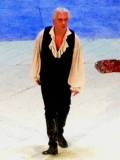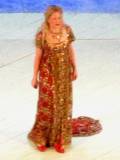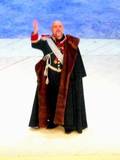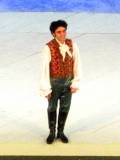This enticed me to the Royal Opera House on Wednesday evening. I have previously written at some length about the production in the Dress Rehearsal. It was the first time I had attended a Dress and was cautious about pronouncing on the musical performance. In the light of Wednesday's performance I am glad that I didn't, and the reservations I carried after the Dress are now irrelevant.
I also have to say that my review is being written in the context of attending a dire "Sir John in Love" at the Coliseum last night. If the order of performances had been reversed, I would probably have enjoyed Sir John more than I did and got even more enjoyment from Eugene Onegin. Ah well, such is life.
The story is taken from Pushkin's novel in verse and is a fairly straightforward story. Two sisters, Tatiana and Olga. Olga is engaged to Lensky. He brings his friend Onegin to visit and Tatiana falls for him. She writes a letter telling of her love. He spurns her, saying he's not the marrying type and their love can only be that of brother and sister (this is where it is interpreted as being semi-autobiographical for Tchaikovsky and the seed of the gay subtext).
At a ball Onegin dances with Olga; Lensky challenges him to a duel, which takes place and Onegin shoots Lensky. A few years later after travelling abroad, Onegin returns to a chance encounter with Tatiana now married to his distant cousin, and he realises the strength of his feelings. But too late.
All over I thought that it was a splendid performance. For the most part my attention did not wander, except when grabbed, for example by the ghastly cow sat next to me who thought it would enhance my enjoyment if she tunelessly hummed along. This was when she wasn't condemning the friezes as dreadful. I wanted to know why they were dreadful. Eg in the case of the naked man frieze, was it the nakedness that upset her, or the lack of naughty bits. Or was it because it - purposely - obscured the action on stage. Everybody's entitled to an opinion but it would help, when inflicting them on me, to expand on the justification. Otherwise, it just sounds like the kneejerk reaction of a posh strangulated cow.
I am not intimate with the opera so I was in no position to find tiny flaws at which to nitpick, as I inevitably do with a more familiar work. Not necessarily to the aid of enjoyment! It's Tchaikovsky, beautiful tunes and lovely orchestration. I thought the orchestra played well without necessarily being on fire. The first night reviews suggested that the conducting was restrained and to a large extent I agree. I had hopes of a more lush richer sound, such as I experienced at ENO last year or in the DVD I have in my possession.
Some people have commented on the Russian diction - Dmitri Hvorostovsky was the only native speaker in the cast - but I can't comment because Russian is entirely foreign to me. And it's not just about pronunciation - there are styles of musical phrasing, and, as a friend pointed out dramatic gestures. But I don't have that understanding.
I thought all the principals were splendid in different ways. I find Dimitri Hvorostovsky an enigma. I have never found his voice to be less than technically superb and very beautiful, although inexplicably he does not hit my 'B-spot'. He is undoubtedly one of the most gifted and thoughtful artists I have seen. Yet, having seen him in the past year in Rigoletto, Ballo and now this, I feel that his acting and projection was most compelling in his Barbican concert. Arguably, Onegin is a cold person until Act 3, but even so, I have to file Dima under "Superb singer, indifferent actor."
I was a lot more impressed by Amanda Roocroft (a fine Lancastrian singer) than I expected. I can't say I care for her voice. I have a love-hate attitude to sopranos. Any hint of squall or wobble become magnified in my mind, whereas I tend to be more forgiving to other voice-types. Certainly she has the chops musically and acted convincingly. But I did find the letter scene to be the only bit where time dragged. It must be fiendishly difficult, basically a monologue, not really an aria, with the stage to herself for a protracted length of time. And it was not the most successful of stagings. Obviously there is little that can really be done to add drama to a teenager pining in her bedroom, unless it was an updated production with teenager drafting her letter on MySpace, but I do not think it was helped that the bedroom was the obligatory ROH box which served to muffle her voice on occasion. Perhaps a bit of OTT diva-ish furniture chewing might have worked...! But she was splendid in the Final Act duet with Onegin, and overall was entirely convincing in the role.
Nina Surguladze as Olga sang with a beautiful voice. I was not especially struck by the character, but she was perfectly fine.
Some of the lesser roles were excellent. None of the comprimario roles were poor and some were excellent. Ryland Davies acted the role of M. Triquet excellently, although his voice ws somewhat strained. But perhpas that was the point. Robert Gleadow, in yet another small role as Zaretsky (Lensky's second in the duel) demonstrated once again that he really is one to watch. He's one of the ROH Young Artists and although only currently playing small roles - in Barbiere, Macbeth and now this - I believe he has a fine voice and that certain je ne sais quoi of reaching beyond the footlights.
Eric Halfvarson was superb as Prince Gremin. He only features in the first part of the last act, and has one aria, but for a small part it has to be well cast. I saw him five times last July as Sparafucile and Hunding; in both Rigoletto and Die Walkure he absolutely delivered the goods, and he did so again tonight, and then some. I have said before that I do have a slight aural problem with basses, finding it almost impossible to hear beauty in their range. But this was something special and was enthusiastically appreciated by the house.
Oh, and Lensky. Yeah, not bad! Regular readers - and occasional readers (Hola Rolando!) - will know that I adore Rolando Villazón. Adoration brings high expectations, and, following the Dress I had my anxieties. These were not entirely dispelled in the first act, but I have to say that I am nit-picking (to me, he sounded a little bit nasally). In Act II Scene 1 he was superb, and he just got better in Scene 2. "Kuda, kuda", aka Lensky's aria, is an amazing aria. The rest of the role of Lensky is very much as support to Onegin and Tatiana, certainly dramatically, but that aria means that the part has to be cast with a first-rate singer. It has a long orchestral introduction. What was extraordinary was that the orchestra was accompanied by the sound of the majority of an audience of over 2,000 clearing their throats. Not because "This is a quiet bit, doesn't matter if I interrupt" but in expectation. When he began singing, I heard a pin drop. Beautiful. Vocally, musically and in depicting the anguish that Lensky was feeling. When he finished, the audience hovered in awestruck animation for a moment which the old bag sitting next to me broke with premature applause.
Overall, it's a beautiful opera. As well as the two arias, for Lensky and Gremin, the highlights musically were the ball scene in Act II and the skating party in Act III, which perhaps serve to remind that although Tchaikovsky is regarded - in Western Europe, at any rate - as a second tier opera composer no one in the history of music can come near him in writing dance music. I suppose I would have wanted a bit more light and oomph from the orchestra: I think in these scenes they were decidedly second best to ENO last year.
Prior informed by the Dress I was prepared to give it a solid B, but after the performance I would go for an A- or Four Stars. Costumes get A++, thanks presumably to Antony McDonald.
Sorry the photos are so grainy - I was sitting in Row M of the Amphitheatre. My camera is good, but not that good!
Conductor: Philippe Jordan
Madame Larina: Yvonne Howard
Tatiana: Amanda Roocroft
Olga: Nina Surguladze
Filipievna: Susan Gorton
Lensky: Rolando Villazón
Eugene Onegin: Dmitri Hvorostovsky
Prince Gremin: Eric Halfvarson
Zaretsky: Robert Gleadow
M.Triquet: Ryland Davies





Comments